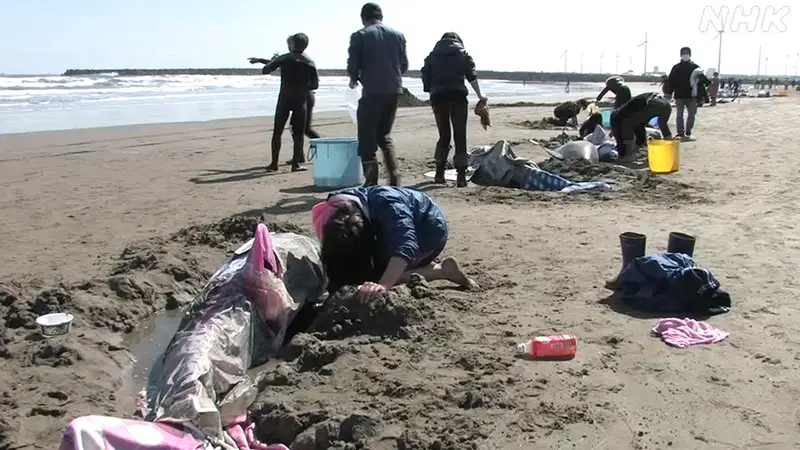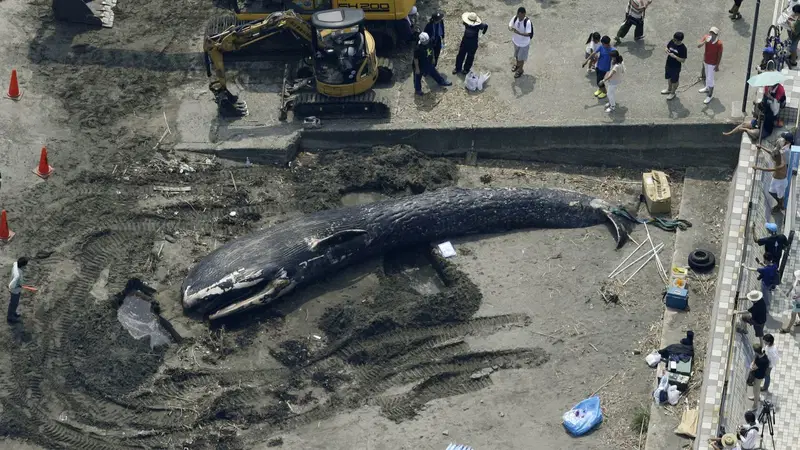After a powerful 8.7 earthquake shakes Kamchatka and tsunami warnings sweep the Pacific, an eerie spectacle unfolds along Japan’s coast: dozens of whales stranded—some lifeless, others struggling for survival.
Is this a natural coincidence or a deeper, mysterious signal from beneath the waves? Experts and locals are left grappling with unsettling questions about what lies behind this haunting event.

The Quake and the Stranding
On July 30, 2025, a massive earthquake struck near Russia’s Kamchatka Peninsula, triggering tsunami alerts throughout the Pacific Rim, including Japan.
Although tsunami waves remained relatively mild—peaking around 60 centimeters in places like Hokkaido and Ibaraki—the shockwaves left coastal communities unsettled.
In Tateyama City, Chiba Prefecture, residents discovered multiple whales washed ashore, sparking widespread alarm. Some were already dead; others fought desperately against the odds, drawing scientists and media to investigate this rare and troubling phenomenon.
Unraveling the Causes

Whale strandings happen occasionally, but their timing—mere hours after a seismic event—raises complex questions:
Tsunami-Triggered Tides: The sudden water withdrawal preceding tsunami waves can leave marine life stranded, similar to water draining from a bathtub, pulling creatures caught near shore into peril.
Disrupted Sonar Navigation: Whales rely on echolocation to navigate the deep. Seismic tremors can distort underwater soundscapes and pressure, disorienting these giants and pushing them toward shallow, dangerous waters.
Social Behavior: Whales are social beings; when one is stranded, others may follow instinctively, resulting in mass beachings.
Between Science and Symbolism
In Japan, unusual animal behavior is often regarded as a harbinger of disaster. Before the devastating 2011 Tōhoku earthquake and tsunami, similar marine strandings occurred, though scientific proof linking such events to earthquake prediction remains elusive.
Still, some view these strandings as messages from the ocean—a mysterious warning echoing through time. Notably, just days before the 2011 tragedy, dozens of dolphins were found stranded near Ibaraki, making this recent occurrence deeply poignant.
The Silent Role of Climate Change

Beyond seismic triggers, the shadow of climate change looms. Warmer oceans, shifting currents, and increased noise pollution from human activity disrupt whale migration and behavior, forcing them into unfamiliar and hazardous coastal zones. This trend of rising strandings is being observed in Japan, Australia, and New Zealand alike.
Experts emphasize that this recent mass stranding is extraordinarily rare and likely the result of overlapping natural forces and environmental stressors.
A Call from the Deep
🚨#BREAKING: Now, at least four whales have washed ashore along Japan’s coastline, just hours after a massive 8.8-magnitude earthquake rocked the region triggering tsunami Warnings watches and advisories pic.twitter.com/Res680IpSn
— R A W S A L E R T S (@rawsalerts) July 30, 2025
The heartbreaking sight of these majestic whales stranded on Japan’s shores is more than a tragedy—it’s a stark symbol of humanity’s fragile connection to the natural world.
Whether viewed as a spiritual omen or a critical environmental alert, it demands our attention.
While the true causes remain partly shrouded in mystery, the warning is clear: ignoring the ocean’s distress signals risks far greater calamities than stranded whales.
Conclusion
The mass whale strandings following the Kamchatka earthquake reveal a disturbing intersection of seismic activity, marine behavior, and climate-driven change.
Scientific theories point to tsunami effects, disrupted navigation, and social instincts, while cultural beliefs interpret the event as a portent. Climate change further complicates the picture by altering marine ecosystems and pushing whales into danger.
This rare and haunting event underscores the delicate balance between humanity and nature, urging urgent reflection and action before the ocean’s warnings turn into irreversible loss.
